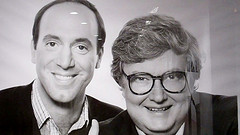So what's been going on you ask? Well, quite a bit. I'm teaching one course (as usual) this summer, and I've started working for our eLearning department as we transition to Canvas, our newest learning management system. I'm getting paid to talk to interesting people, research and solve problems with teachers and technology while collaborating with people who care about the future of online learning. That's a quick summary of my Mondays-Wednesdays. On Thursdays, I'm working from home to create a course for our Title III grant. There is simply not enough time to do everything that I want to do. This position came quite unexpectedly, and I had put off completing some other work thinking I'd have plenty of time this summer. This position started a month ago, and I've been playing catch up ever since. You'll hear no complaints from me. I feel so completely lucky to love what I'm doing.
I'm in the mix for a new position at my college, and should that happen, then I'll start a new blog if I get the job. Even if I don't, I'll still be very happy with the different hats that I get to wear. This blog for ETMOOC has been a grand experiment of trying out blogging for the first time. I'll later refer to it as my "starter blog" when I create something new. I've done some writing, of course. I've written new cover letters, resumes, and participated in phone interviews. It's been unexpectedly busy summer. I've never had what I used to call a "teacher summer." You know, those mythical summers where teachers don't work for three months? Me neither.
I chose this photo of my dog so that I can remember this moment of his summer. We call this activity "Belly Sunning." And this PNW summer is one of the finest I have ever seen. Elroy spends his days going between sun and shade on our deck. We've created this lovely outside office on our deck where the mister, the dog, and I spend our afternoons as the sun sinks west.
We use our new espresso machine to make coffees that we sip in the shade. We read and work, and he moves from ideal spot to better spot in the sun. My neighbor's tree shades the sun during the hottest hours and the sun shines in rays through the branches. Squirrels run along the fence to steal my berries, humming birds zip around from flower to flower, bees hum on the lavender, and various birds fly from the pond east of our house to the lake. Sea planes fly towards the bay.
My dog sleeps through it all, and this is photo captures his favorite spot. Summer is his season. I'd say it was my season as well, but if you know me well, you know how much I love a powder day in the mountains and muddy cylcocross races. Those days already feel like they are around the corner. Just like August.
We use our new espresso machine to make coffees that we sip in the shade. We read and work, and he moves from ideal spot to better spot in the sun. My neighbor's tree shades the sun during the hottest hours and the sun shines in rays through the branches. Squirrels run along the fence to steal my berries, humming birds zip around from flower to flower, bees hum on the lavender, and various birds fly from the pond east of our house to the lake. Sea planes fly towards the bay.
My dog sleeps through it all, and this is photo captures his favorite spot. Summer is his season. I'd say it was my season as well, but if you know me well, you know how much I love a powder day in the mountains and muddy cylcocross races. Those days already feel like they are around the corner. Just like August.




















